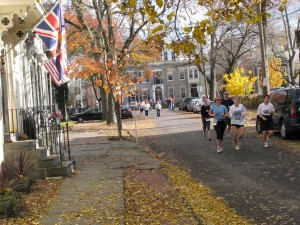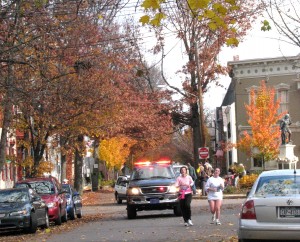.. three stories from around my town . .
 Copyright and Community Message Boards: To be honest, I’m surprised it took them so long. This week, our local newspaper, the Schenectady Gazette, sent demands to stop copyright infringement to two popular community message boards that have for years been posting several Gazette articles a day in their entirety (with attribution and a link to the Gazette homepage, but no direct link to the article). One internet community focuses primarily on Schenectady and the other on our major suburb Rotterdam, NY. They both have lively discussion on public issues every day.
Copyright and Community Message Boards: To be honest, I’m surprised it took them so long. This week, our local newspaper, the Schenectady Gazette, sent demands to stop copyright infringement to two popular community message boards that have for years been posting several Gazette articles a day in their entirety (with attribution and a link to the Gazette homepage, but no direct link to the article). One internet community focuses primarily on Schenectady and the other on our major suburb Rotterdam, NY. They both have lively discussion on public issues every day.
update (Nov. 14, 2008): Yesterday, Pat Zollinger, Administrator of the local internet forum The Unadulterated Schenectady, received the official desist letter from the Gazette‘s lawyer, Michael J. Grygiel of the Albany office of Hiscock & Barclay. Click to see the Letter. You’ll find a Comment from Pat and my response below.
At Schdy.Info and at the Rotterdam Internet forum, there is a lot of talk that this whole crackdown is political, and Schenectady’s Mayor Brian U. Stratton is behind it. For the reasons given in my response below and my reply at the Rotterdam Forum, I disagree. Of course, we don’t have all the facts and aren’t all that good at reading minds.
At their Editors’ Notebook weblog, the Gazette Managing Editor Judy Patrick, posted an explanation titled “Link to us” on Thursday (Nov. 6, 2008). It gives the hard-to-believe impression that Gazette editors were somehow never aware of the full-article postings at the message boards until reporter Justin Mason referred to one of them this week. After praising the robust discussion at the internet fora, Patrick says:
 “We at The Gazette like our articles to generate public discussion anywhere: in diners, on private message boards or here on our own Web site. But please remember that our stories are protected by copyright and posting them in their entirety without our permission violates that copyright.”
“We at The Gazette like our articles to generate public discussion anywhere: in diners, on private message boards or here on our own Web site. But please remember that our stories are protected by copyright and posting them in their entirety without our permission violates that copyright.”
She correctly states that Fair Use rights do not cover such posting [to learn more see the useful set of Frequently Asked Questions about Copyright and Fair Use, from The Chilling Effects Clearinghouse; or see my 2006 post at SHLEP for more links and discussion, or my piece on Haiku and Fair Use]. The Gazette editor then suggests an alternative that this weblog and millions of others regularly practice:
“Posting our entire stories is not fair use of our copyrighted work. We don’t object when sites summarize one of our stories and then provide a direct link to the actual story on our Web site. That’s become a fairly standard way bloggers refer to published works. People who want to read the whole story are provided a quick and easy way to reach it. That sends readers to our Web site, which is important to us, but as well allows them to return to the original site.
. .  By regularly posting a variety of Gazette articles in their entirety, the community sites probably do deprive the Gazette of some news-stand and at-home purchases, and certainly deter click-throughs to the Gazette website, which help attract advertisers. Patrick is correct on the law, but whether this copyright crackdown is worth the bad will being created in the community is questionable. She tries to explain:
By regularly posting a variety of Gazette articles in their entirety, the community sites probably do deprive the Gazette of some news-stand and at-home purchases, and certainly deter click-throughs to the Gazette website, which help attract advertisers. Patrick is correct on the law, but whether this copyright crackdown is worth the bad will being created in the community is questionable. She tries to explain:
“We are not a big corporation trying to stifle public comment; we are a small, family-owned newspaper trying to safeguard our intellectual property.”
I’m not sure how the two community message boards are going to react. The Rotterdam site initially issued a cryptic statement about curtailing its activities. But, today, it seems to be back to business as usual. The rowdy regulars at both sites have been quite vocal in their contempt and anger for the Gazette. Some are suggesting that it is criticism of the Gazette by the site administrators that provoked the crackdown after years of the Gazette averting its corporate eyes to the copyright infringement issue.
In a surprise twist, Gazette reporter Justin Mason sent an email to the Rotterdam forum’s administrators, apologizing for the actions of his editors. See “Justin Mason explains and apologizes” (Nov. 7, 2008). He gave permission for the message to be posted at the site. Among other things, Mason says:
 “I just wanted to offer my apologies to [Administrator Jo-Ann Schrom] and the other users of the forum for my newspaper’s recent overreaction toward Rotterdamny.info reprinting Gazette articles.”
“I just wanted to offer my apologies to [Administrator Jo-Ann Schrom] and the other users of the forum for my newspaper’s recent overreaction toward Rotterdamny.info reprinting Gazette articles.”
He opines that the suggested practice of summarizing with short quotes and a link to the Gazette website is “much more flawed than the format Rotterdamny.info used, seeing as though the Gazette still doesn’t publish more than a third of its print content online.”
He also declares: “Both myself and other reporters have discussed the site with them dozens of times before without them expressing any concern for copyright issues and whatnot.”
Mason is probably correct saying that “I have no power or influence over the editorial decision making process” and that cooler heads probably will not prevail. We shall have to wait to see how this public rebuke of his bosses and their “poor error in judgment” will affect Mason’s career at the Gazette. How the two internet community sites will adjust is also up in the air.
We think the link-quote-summarize approach used successfully by so many weblogs should allow the valuable discussion at the community sites to continue. However, the practice takes a lot more work for the administrators than merely copying an article in full, so it may limit the topics presented. It may also mean that many of those joining in the discussion will not have all the facts available in the full article before they voice their reactions. Forum members need to be reminded that clicking through to the Gazette article, and then returning to their forum, won’t really take more time than reading the full article at the community forum.
background fyi: (Sunday evening, Nov. 9, 2008): Earlier today, I posted the following updates near the top of this posting; because the second update pretty much moots out the first one, I’ve moved them here, out of the way of the main story. I’m keeping them as part of the record and because they help explain a few of the messages in our Comment section:
 update (Nov. 9, 2008): As you can see in our Comment section, I was quite surprised this morning to learn that the Gazette staff has removed a Comment that I left at the weblog post by their Managing Editor that is discussed immediately below. If I get an explanation from the Gazette, I will let you know. I’ve attempted to reconstruct my removed comment here. None of the other 52 comments that I have left at the Gazette website since February 2008 has been deleted by its staff. [You can use this Tiny URL to cite to this post: http://tinyurl.com/fkaGazetteCopyright ]
update (Nov. 9, 2008): As you can see in our Comment section, I was quite surprised this morning to learn that the Gazette staff has removed a Comment that I left at the weblog post by their Managing Editor that is discussed immediately below. If I get an explanation from the Gazette, I will let you know. I’ve attempted to reconstruct my removed comment here. None of the other 52 comments that I have left at the Gazette website since February 2008 has been deleted by its staff. [You can use this Tiny URL to cite to this post: http://tinyurl.com/fkaGazetteCopyright ]
update (noon, Sunday Nov. 9, 2008): Gazette Online Editor Mark Robarge just left a comment saying “David, my mistake in removing your comment from our Web site. I hit the wrong checkbox this morning while monitoring comments. It has been restored to the site.” He left a similar comment at the Gazette’s Editors’ Notebook, where my first comment has indeed been restored. Given the number of senior moments that go on around here, I’m going to give Mark the benefit of the doubt.
 .. Wendy Cook Gets It Together: Because she’s the daughter of Funny Cide horse-owner Jack Knowlton, Wendy Knowlton-Cook’s slide into drug abuse and its criminal consequences has gotten far more attention than the initial sordid facts might otherwise have warranted. (See our earlier posting about her arrest and halting attempts at rehab.) Ms. Cook lost custody of her children, did eight months in jail, and has spent three months in rehab, after an arrest in October 2007 for performing sex acts and snorting cocaine with her then 2-month-old son and 5-year old daughter in the back seat of her car. Today’s Schenectady Gazette brought news that she may have turned the corner and be heading for brighter days. According to the article “Mom gets kids after rehab: Woman accused of prostitution” (Nov. 8, 2008), Ms. Cook now shares joint custody of her children with her parents, and is officially on probation, while continuing in a substance abuse program, and with ongoing monitoring by Social Services.
.. Wendy Cook Gets It Together: Because she’s the daughter of Funny Cide horse-owner Jack Knowlton, Wendy Knowlton-Cook’s slide into drug abuse and its criminal consequences has gotten far more attention than the initial sordid facts might otherwise have warranted. (See our earlier posting about her arrest and halting attempts at rehab.) Ms. Cook lost custody of her children, did eight months in jail, and has spent three months in rehab, after an arrest in October 2007 for performing sex acts and snorting cocaine with her then 2-month-old son and 5-year old daughter in the back seat of her car. Today’s Schenectady Gazette brought news that she may have turned the corner and be heading for brighter days. According to the article “Mom gets kids after rehab: Woman accused of prostitution” (Nov. 8, 2008), Ms. Cook now shares joint custody of her children with her parents, and is officially on probation, while continuing in a substance abuse program, and with ongoing monitoring by Social Services.
Wendy has admitted to possessing cocaine, but not to the other charges, and yesterday told reporters:
“I made a commitment in this process. I surrendered wholly to the creator. I have to come first. If I don’t take care of me, I can’t take care of my children. It’s just an everyday commitment to wellness.”
As a former Family Court Law Guardian (lawyer for the child), I’m rooting for Wendy and her kids, and hope that her strong family support and personal commitment will mean she has favorable odds of success. Like Schenectady City Court Judge Christine Clark did at court yesterday, the f/k/a Gang says:
“I’m happy to see you doing much better. I hope you keep it up.”
 Cuomo’s Quixotic Code of Conduct: We told you last July, in “Cuomo tilts at pols and windmills,” that New York’s Attorney General Andrew Cuomo had opened an investigation into possible improper dealings between two wind power companies and local government officials, and into possible anticompetitive behavior by the firms. Last week, we learned that the two target firms have agreed to abide by a new Code of Conduct promulgated by the AG’s Office to make the process of siting wind-farms more open and fair. See “Wind power companies, Cuomo reach agreement,” The Buffalo News, Oct. 30, 2008); and “Amid Talk of Hidden Deals, Wind Firms Agree to Code of Conduct” (New York Times, October 30, 2008). According to the Buffalo News:
Cuomo’s Quixotic Code of Conduct: We told you last July, in “Cuomo tilts at pols and windmills,” that New York’s Attorney General Andrew Cuomo had opened an investigation into possible improper dealings between two wind power companies and local government officials, and into possible anticompetitive behavior by the firms. Last week, we learned that the two target firms have agreed to abide by a new Code of Conduct promulgated by the AG’s Office to make the process of siting wind-farms more open and fair. See “Wind power companies, Cuomo reach agreement,” The Buffalo News, Oct. 30, 2008); and “Amid Talk of Hidden Deals, Wind Firms Agree to Code of Conduct” (New York Times, October 30, 2008). According to the Buffalo News:
“The code bans wind companies from hiring local government officials or their relatives for one year after approval of a wind energy deal. It also bans companies from seeking, using or receiving ‘confidential information’ obtained by a locality about a pending project. Companies also will have to post on a web site the names of any municipal officials or their relatives with any financial stake in the firms.
“Wind easements and leases will have to be publicly filed with county clerks. Companies must conduct seminars to educate their workers about preventing conflicts of interests in dealings with local officials.”
The Code is, however, voluntary, and an article in yesterday’s Schenectady Gazette (not available online without a subscription) is headlined “Wind power code gets mixed response” (Nov. 7, 2008). It’s one thing for two companies feeling the pressure of a high-profile investigation to “voluntarily agree” to abide by the Code, but quite another for the industry in general. As Kevin Crosier, Supervisor of the Albany County Town of Berne told the Gazette:
 “It’s a lukewarm response to a very serious problem that’s plaguing local government throughout New York State.” And,
“It’s a lukewarm response to a very serious problem that’s plaguing local government throughout New York State.” And,- “Basically what they’re doing is leaving small communities to fight this on their own.”
The article states that at least one citizens group (Schoharie Valley Watch) plans to lobby to make the Code mandatory. Cuomo and legislators such as State Sen. Hugh Farley, R-Niskayuna, say we should wait to see how the voluntary rules work. Despite the popularity of wind power these days, we think the public is much more in the mood for regulation of energy companies than it might have been only a year ago. The process of siting wind farms should be just as clean as the energy they hope to produce.
You may recall that my brother, East Aurora attorney Arthur J. Giacalone (see his essay “Zoning Challenges: Overcoming Obstacles“) Arthur J. Giacalone, frequently represents homeowners in Western New York against wind power companies. He recently told the Buffalo News — in the article “Like it or not, wind power is changing the landscape in WNY” (by Michael Beebe, October 26, 2008) — that the wind companies decide where they want to develop and then approach large landowners and town officials to seal the deal before most of the town knows a project has been proposed. The News continued:
“Giacalone has won some and lost some in the wind battle, but he said the wind companies and the towns have the upper hand. His lawsuits are aimed at conflicts of interest, zoning violations, and making sure the state’s environmental quality reviews are followed.
“ ‘It’s hard for me to see the positive side of any industry when I see the sordid side of it,’ Giacalone said.”
I’ll see if I can get Arthur to stop by and Comment on this topic at his brother’s humble little website. [update (Nov. 17, 2008): See John Horan’s Global Climate Law Blog]
 p.s. Apologies to anyone who thought the word “Wendy” in our headline referred to the luminous Wendy Savage, Esq. If you need your WS fix, try this post or that one. If it’s haiku you seek, here are a few from Billie Wilson, the centerfold guest poet in the newest edition of Upstate Dim Sum:
p.s. Apologies to anyone who thought the word “Wendy” in our headline referred to the luminous Wendy Savage, Esq. If you need your WS fix, try this post or that one. If it’s haiku you seek, here are a few from Billie Wilson, the centerfold guest poet in the newest edition of Upstate Dim Sum:
last light
wicker baskets
of nectarines
anniversary —
small craft warnings
on the radio
to-do list done
the day softens
into dusk
wind chill
the priest lifts her arms
to bless the fleet
… by Billie Wilson – Guest Poet in Upstate Dim Sum (2008/II)
 .. There’s been more action since we wrote about the Schenectady Daily Gazette cracking down on local internet forums that were infringing on its copyright (by posting entire articles and not even linking to the article). The Gazette says linking to them with a summary and short quote is fine, but lifting the whole article or editorial goes too far. Yesterday, Pat Zollinger, Administrator of the local internet forum The Unadulterated Schenectady, received the official desist letter from the Gazette’s lawyer, Michael J. Grygiel of the Albany office of Hiscock & Barclay. Click to see the Letter. You’ll find a Comment from Pat and my response below.
.. There’s been more action since we wrote about the Schenectady Daily Gazette cracking down on local internet forums that were infringing on its copyright (by posting entire articles and not even linking to the article). The Gazette says linking to them with a summary and short quote is fine, but lifting the whole article or editorial goes too far. Yesterday, Pat Zollinger, Administrator of the local internet forum The Unadulterated Schenectady, received the official desist letter from the Gazette’s lawyer, Michael J. Grygiel of the Albany office of Hiscock & Barclay. Click to see the Letter. You’ll find a Comment from Pat and my response below.![]() For years, The Mainichi Daily News (an English-language Japanese newspaper) offered a selection of about a dozen haiku every month, some of which we’ve shared here. Although that feature apparently ended last August, Mainichi now presents a Daily Haiku.
For years, The Mainichi Daily News (an English-language Japanese newspaper) offered a selection of about a dozen haiku every month, some of which we’ve shared here. Although that feature apparently ended last August, Mainichi now presents a Daily Haiku. And, I just discovered today that Issa is now on Twitter. You can get a classic poem from the Japanese Master Kobayashi Issa everyday on Twitter, translated by Haiku Guy David G. Lanoue. Except that they all come out as one-liners, tiny poems are a fine match for Twitter’s tiny format. Here’s today’s Issa on Twitter:
And, I just discovered today that Issa is now on Twitter. You can get a classic poem from the Japanese Master Kobayashi Issa everyday on Twitter, translated by Haiku Guy David G. Lanoue. Except that they all come out as one-liners, tiny poems are a fine match for Twitter’s tiny format. Here’s today’s Issa on Twitter: ..
.. .. Haier HLT71 7″ Portable Lcd Tv ($120 to $150) — this little digital tv is the Hottest Item around these days. Indeed, it’s
.. Haier HLT71 7″ Portable Lcd Tv ($120 to $150) — this little digital tv is the Hottest Item around these days. Indeed, it’s 


 I chose the Philips SDV2210/17 over the $8.96 antenna from RCA, because it came with something called a 75/300 ohm Transformer, which would let me connect the antenna’s coaxial cable to the Antenna Pad for insertion into the tv’s Ext. Ant. Jack. (Should you need one, the connector is available separately for about 4 bucks, e.g.,
I chose the Philips SDV2210/17 over the $8.96 antenna from RCA, because it came with something called a 75/300 ohm Transformer, which would let me connect the antenna’s coaxial cable to the Antenna Pad for insertion into the tv’s Ext. Ant. Jack. (Should you need one, the connector is available separately for about 4 bucks, e.g., 





 By the way, whether you’re concerned or thrilled that “
By the way, whether you’re concerned or thrilled that “
 . . . by
. . . by 


 Boo! Despite
Boo! Despite 


 .. Wendy Cook Gets It Together: Because she’s the daughter of
.. Wendy Cook Gets It Together: Because she’s the daughter of  Cuomo’s Quixotic Code of Conduct: We told you last July, in “
Cuomo’s Quixotic Code of Conduct: We told you last July, in “ “It’s a lukewarm response to a very serious problem that’s plaguing local government throughout New York State.” And,
“It’s a lukewarm response to a very serious problem that’s plaguing local government throughout New York State.” And,


 [
[ If you think college professors all have easy sinecures after a couple decades on the job, you haven’t seen Yu Chang [a man of a
If you think college professors all have easy sinecures after a couple decades on the job, you haven’t seen Yu Chang [a man of a 
 ..
..






 p.s. The whole
p.s. The whole 


 .. While all the web pundits are yakking about tomorrow’s Presidential Election, Prof. Yabut wants me to deal with a more personal issue that has been giving him agita for even longer than this interminable political campaign:
.. While all the web pundits are yakking about tomorrow’s Presidential Election, Prof. Yabut wants me to deal with a more personal issue that has been giving him agita for even longer than this interminable political campaign:


 I just clicked on
I just clicked on 


 aftershots (Nov. 20, 2008): No, the cranky Schenectady Gazette columnist Carl Strock is not a father-figure for me. But, he is often an inspiration for punditry here at f/k/a. I never thought of Carl as a photographer, too, but he demonstrated his prowess with a Powershot on a recent trip to Mexico, which overlapped with the Dead of the Dead. You’ll find the
aftershots (Nov. 20, 2008): No, the cranky Schenectady Gazette columnist Carl Strock is not a father-figure for me. But, he is often an inspiration for punditry here at f/k/a. I never thought of Carl as a photographer, too, but he demonstrated his prowess with a Powershot on a recent trip to Mexico, which overlapped with the Dead of the Dead. You’ll find the 
 If your skills, propensities or dreams make you want to put that law degree to work (or aside) as an author, check out “
If your skills, propensities or dreams make you want to put that law degree to work (or aside) as an author, check out “ You don’t have to do much to convince the f/k/a Gang that there is a natural fit between lawyers and literature (or the subset
You don’t have to do much to convince the f/k/a Gang that there is a natural fit between lawyers and literature (or the subset 